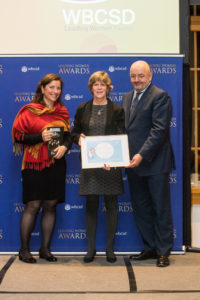DuPont People Spotlight: Dawn Rittenhouse Recognized with Sustainability Leading Women Award
 For large companies that have been around for a while, invested capital is a major challenge. Once an investment is made, it can be difficult if not impossible to change course. It makes sense when approached from a personal level. Take your car as an example. Every day you can try to drive fewer miles, carpool, or use public transportation but you only get the opportunity to make the big decision on what car to purchase occasionally. Corporations have the same challenge – once we have invested in a new facility, it may have a lifetime of 30-40 years and it is very difficult to make major changes. It’s is a similar concept in product development – if you don’t consider sustainability early in the process, decisions are made that limit the ability to really make a difference in the sustainability impact of the product.
Another major challenge is that when we bring new, more sustainable products to the market they are often more expensive than the incumbents because we have not had the time to scale up and become more efficient. One example of this is bio-based materials, which can have a hard time competing against fossil-based materials.
Opportunities?
I believe that as a society we really want to solve the major challenges such as assuring there is enough healthy and nutritious food for everybody, reducing our dependence on fossil fuels and protecting people and the environment. For an innovation-focused company like DuPont, there are so many opportunities to develop new products and services that help solve those challenges in a way that both creates value both for society and our shareholders.
Why are you optimistic about the future of sustainability in the business community? Why are you not optimistic?
I think that people who work in the sustainability area are by nature optimistic. The challenges are huge and on lots of days it can feel like we aren’t making any progress. But if you look back a few years, you can see the real progress that has been made. I believe that the next generation, the Millennials, who are now the largest generation in the workforce, will push their companies even harder to make a difference. Companies that understand sustainable value will differentiate themselves and attract and keep the best and the brightest young talent.
How do you think corporations should be engaging with the UN Sustainable Development Goals?
Going back to the first question, the SDGs are a way to create a common language and framework for sustainability. The SDGs were only released in September 2015, but already companies are linking their strategies and voluntary commitments to the goals and metrics. In time, as governments start to drive policies to assure progress on the goals, business will partner with others to create new business opportunities.
Dawn Rittenhouse is the Director of Sustainable Growth for DuPont.
This article was originally published on http://3blmedia.com/
For large companies that have been around for a while, invested capital is a major challenge. Once an investment is made, it can be difficult if not impossible to change course. It makes sense when approached from a personal level. Take your car as an example. Every day you can try to drive fewer miles, carpool, or use public transportation but you only get the opportunity to make the big decision on what car to purchase occasionally. Corporations have the same challenge – once we have invested in a new facility, it may have a lifetime of 30-40 years and it is very difficult to make major changes. It’s is a similar concept in product development – if you don’t consider sustainability early in the process, decisions are made that limit the ability to really make a difference in the sustainability impact of the product.
Another major challenge is that when we bring new, more sustainable products to the market they are often more expensive than the incumbents because we have not had the time to scale up and become more efficient. One example of this is bio-based materials, which can have a hard time competing against fossil-based materials.
Opportunities?
I believe that as a society we really want to solve the major challenges such as assuring there is enough healthy and nutritious food for everybody, reducing our dependence on fossil fuels and protecting people and the environment. For an innovation-focused company like DuPont, there are so many opportunities to develop new products and services that help solve those challenges in a way that both creates value both for society and our shareholders.
Why are you optimistic about the future of sustainability in the business community? Why are you not optimistic?
I think that people who work in the sustainability area are by nature optimistic. The challenges are huge and on lots of days it can feel like we aren’t making any progress. But if you look back a few years, you can see the real progress that has been made. I believe that the next generation, the Millennials, who are now the largest generation in the workforce, will push their companies even harder to make a difference. Companies that understand sustainable value will differentiate themselves and attract and keep the best and the brightest young talent.
How do you think corporations should be engaging with the UN Sustainable Development Goals?
Going back to the first question, the SDGs are a way to create a common language and framework for sustainability. The SDGs were only released in September 2015, but already companies are linking their strategies and voluntary commitments to the goals and metrics. In time, as governments start to drive policies to assure progress on the goals, business will partner with others to create new business opportunities.
Dawn Rittenhouse is the Director of Sustainable Growth for DuPont.
This article was originally published on http://3blmedia.com/Other News & Insights
LWA 2018 – Giulia Genuardi
Giulia Genuardi Head of Sustainability Planning and Performance Management Innovability (Innovation & Sustainability) She holds a degree in Economics and Commerce from the University of Palermo, as well as a master in Administration, Finance and Control from the...
LWA 2018 – Gabriela Burlan
Gabriela BurlanGlobal Director for Sustainable Agriculture at Bayer USGabriela Burian is the Global Director for Sustainable Agriculture at Bayer US - Crop Science. She represents Bayer as the Liaison Delegate with the World Business Council for Sustainable...
LWA 2018 – Friederike Kienitz
Friederike KienitzVice President Legal, External and Government Affairs, Nissan EuropeWho is Friederike?Friederike became Vice President of Legal, External and Government Affairs in April 2014 and is based at Nissan International SA in Rolle, Switzerland. She is a...
